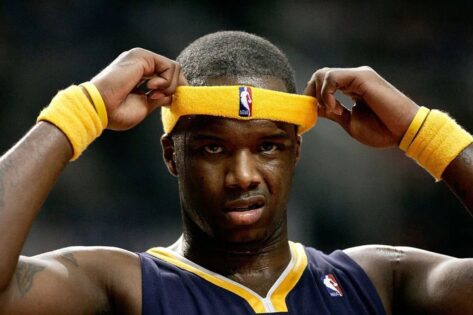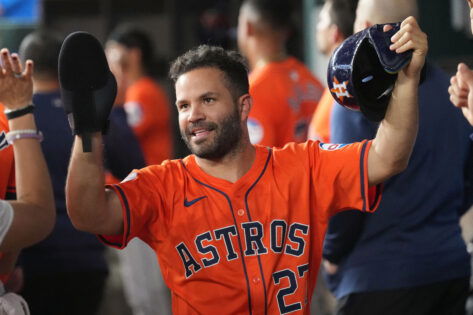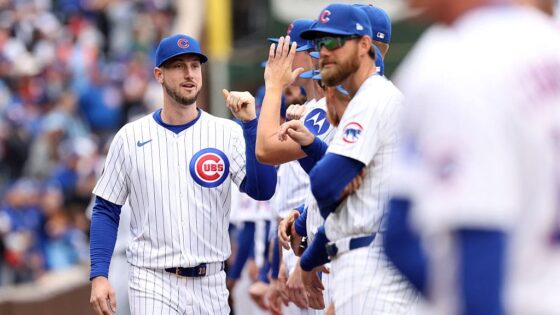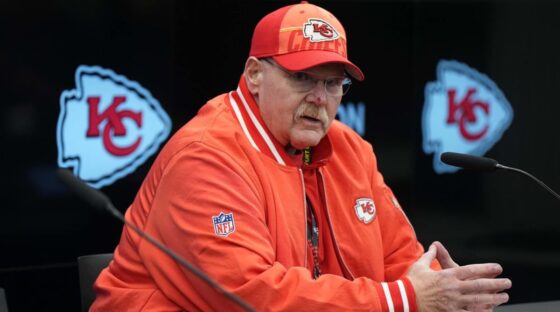Nearly two decades later, the scars haven’t healed for Jermaine O’Neal. Not from the punches thrown or the chaos on the court, but from the silence that followed. The 2004 Malice at the Palace may have faded from headlines, but for O’Neal, the real pain came after the brawl ended. When the Indiana Pacers turned their backs on the very player who once bled for their jersey.”
Back in 2004, that infamous night in Detroit started with a hard foul on Ben Wallace and escalated when a fan launched a drink at Ron Artest. What followed was nothing short of mayhem. Players stormed into the stands, fists flew, and bystanders became unwilling participants in one of the NBA’s most explosive episodes. O’Neal, alongside Artest, Stephen Jackson, and Wallace, ended up suspended—his reputation thrown into the storm.
Still, what stings more for O’Neal wasn’t the punishment—it was the abandonment. “They left me out there to dry, bro,” he revealed during his appearance on the Out The Mud Podcast. “I’m talking about to this very moment. They have never said, ‘Ok, well JO, listen man, I get it, it was a terrible situation.’” For a player who poured everything into that team, hearing nothing but silence was louder than any crowd boos.
Moreover, O’Neal made it clear—he’s not asking for handouts. But he expected some accountability from the league. “When you give everything you’ve got, the NBA has a responsibility, just like you tell us we have a responsibility to show up and represent them the way they need to be represented,” he said. Although later footage confirmed it began with an intoxicated fan, the narrative was already set. And with it, O’Neal’s career took a detour it never recovered from.
Naturally, the betrayal by the Pacers cut the deepest. “The Pacers are special to me, and that’s why I was so hurt,” he confessed. “I was hurt, bro, when they didn’t say anything. Suit up for me like I suit up for you. Suit up for me like I suit up for your community. I treated your community like I was from your community.” That kind of emotional hit doesn’t just go away. It lingers—wrecking not just focus, but love for the game itself.
Apr 6, 2014; Oakland, CA, USA; Golden State Warriors center Jermaine O’Neal (7) looks on against the Utah Jazz during the third quarter at Oracle Arena. The Warriors defeated the Jazz 130-102. Mandatory Credit: Kyle Terada-USA TODAY Sports
And unfortunately, it did. “I lost all love for basketball,” O’Neal admitted. “I did not love basketball the rest of my career, and that’s when my body started to break down.” Now at 46, he leans on pain meds just to manage daily life. But no pill can numb the ache of betrayal. “Forever. You let a narrative be created. Not only created, but let it be engraved,” he reflected, his voice heavy with truth.
O’Neal nevertheless ensured his side of the story was heard. He made that effort at every turn.
Jermaine O’Neal feels let down by the people he called family
This wasn’t the first time Jermaine O’Neal spoke out about that night in Detroit. In February 2024, he sat with the Indy Star to once again recount the weight he’s carried for years. What still bugs him? The way it all got framed. Not just the chaos on the court, but the way media coverage turned the Pacers into villains, without ever really digging into what led to the eruption. For O’Neal, that unfair portrayal has lingered far too long.
“I think the brawl itself is one of the most understood and misused things,” he told the Indy Star. He didn’t hold back either when talking about the press. “Even from just a media standpoint, it was disappointing, to say the least, how it was handled.”
And while people have questioned why players never spoke up sooner, O’Neal had an answer. “Many people (say) that about this or the average fan who wonders about this as a Pacers fan, they don’t realize that we were, by law, not able to talk about the brawl because of the criminal, civil and federal cases that were pending that went on years after the brawl.”
Still, the silence came at a cost. “For whatever reason, it was as if I was criminalized for something that when you look at it, I would do it again if put in the exact same position.” What hurt more? The lack of support. O’Neal admitted he wished more NBA peers and Pacers staff had stood by him publicly.
But perhaps the most personal sting came from how disconnected he felt afterward. “I was disappointed that my family, my sports family, didn’t speak about it,” he said. Even after winning the NBA’s Community Assist Award three times, he felt that the narrative marched on unchecked. Now, he insists the world finally hear his side.
The post Pacers’ Betrayal Still Stings as Jermaine O’Neal Admits Truth Behind Scathing Accusations appeared first on EssentiallySports.



